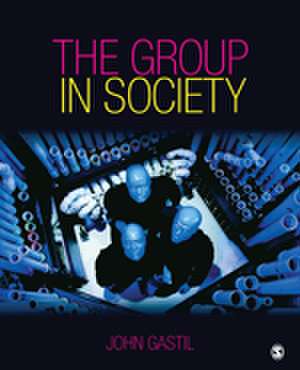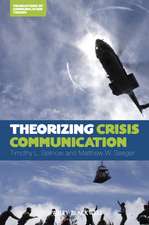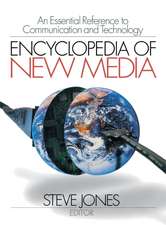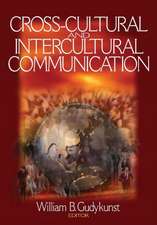The Group in Society
Autor John W. Gastilen Limba Engleză Paperback – 16 sep 2009
Preț: 832.65 lei
Preț vechi: 1140.62 lei
-27% Nou
159.35€ • 173.03$ • 133.85£
Carte tipărită la comandă
Livrare economică 22 aprilie-06 mai
Specificații
ISBN-10: 1412924685
Pagini: 328
Dimensiuni: 187 x 232 x 15 mm
Greutate: 0.5 kg
Ediția:1
Editura: SAGE Publications
Colecția Sage Publications, Inc
Locul publicării:Thousand Oaks, United States
Cuprins
1. Small Groups Up Close
Understanding Groups
How We Learn About Groups
Putting the Pieces Together
Illustration: Terrorist Cells
2. Wiring Groups into Organizations and Society
Building a Theoretical Framework
The Embedded System Approach
Small Group Archetypes
Illustration: Self-Managed Work Teams
PART II. DISCUSSIONS AND DECISIONS
3. Making Group Decisions
Understanding the Modern Jury
Summary Model of Jury Deliberation
Agreements and Social Influence
Summary Decision Making Model
4. Establishing Discussion Procedures
The Group Network
Designing Discussion
Choose a Decision Rule
Summary Model of Emergent Structure
5. Guiding the Flow of Ideas and Information
Assembling a Task Force
Generating Creative Ideas
Gathering and Exchanging Information
PART III. ROLES, RELATIONSHIPS, AND IDENTITY
6. Leading the Team
Teamwork and Group Effectiveness
Loving the Leader
Negotiating Roles and Status
Summary Model: The Group as Microcosm
7. Forging Group Bonds
Groups Across the Lifespan
Banding Together and Tearing Apart
Cohesion and Harmony
Summary Model of Group Bonding
8. Shifting Social Identities
Maintaining Group Norms
Symbolic Life in Groups
Securing a Social Identity
Summary Model of Conflict and Convergence
9. Learning and Growing
Unconscious Group Behavior
Personal Growth
Summary Model of Group Learning
Group Development
PART IV. INTEGRATION AND CONCLUSION
10. The Power of Knowledge
Using Group Theory for Social Change
Reprising the Embedded System Framework
Final Questions and Insights
Notă biografică
John Gastil is a Professor in the Department of Communication at the University of Washington, where he specializes in political deliberation and group decision making. Prior to joining the University of Washington in 1998, Gastil received his communication Ph.D. from the University of Wisconsin-Madison in 1994 and worked for three years at the University of New Mexico Institute for Public Policy.
In 1993, Gastil published Democracy in Small Groups (New Society Publishers), and he continued to explore democracy and deliberation at many levels of analysis in By Popular Demand: Revitalizing Representative Democracy through Deliberative Elections (University of California, 2000), The Deliberative Democracy Handbook: Strategies for Effective Civic Engagement in the Twenty-First Century (co-edited with Peter Levine, Jossey-Bass, 2005), and Political Communication and Deliberation (Sage, 2008).
The National Science Foundation has supported three large-scale research programs in which Gastil has served as a principal investigator. The Jury and Democracy Project rediscovered the jury system as a valuable civic educational institution. Gastil has also contributed to the Cultural Cognition Project, which explores the cultural underpinnings of attitudes toward various public policy issues. Most recently, Gastil has worked with Australian colleagues to study the flow of ideas and arguments through the Citizens¿ Parliament held in Canberra in 2009.
Gastil¿s scholarly articles from these and other projects have appeared in Adult Education Quarterly, Communication Theory, Harvard Law Review, Human Communication Research, Human Relations, Journal of Applied Social Psychology, Journal of Communication, Journal of Public Deliberation, Political Communication, Small Group Research, and other academic journals.














